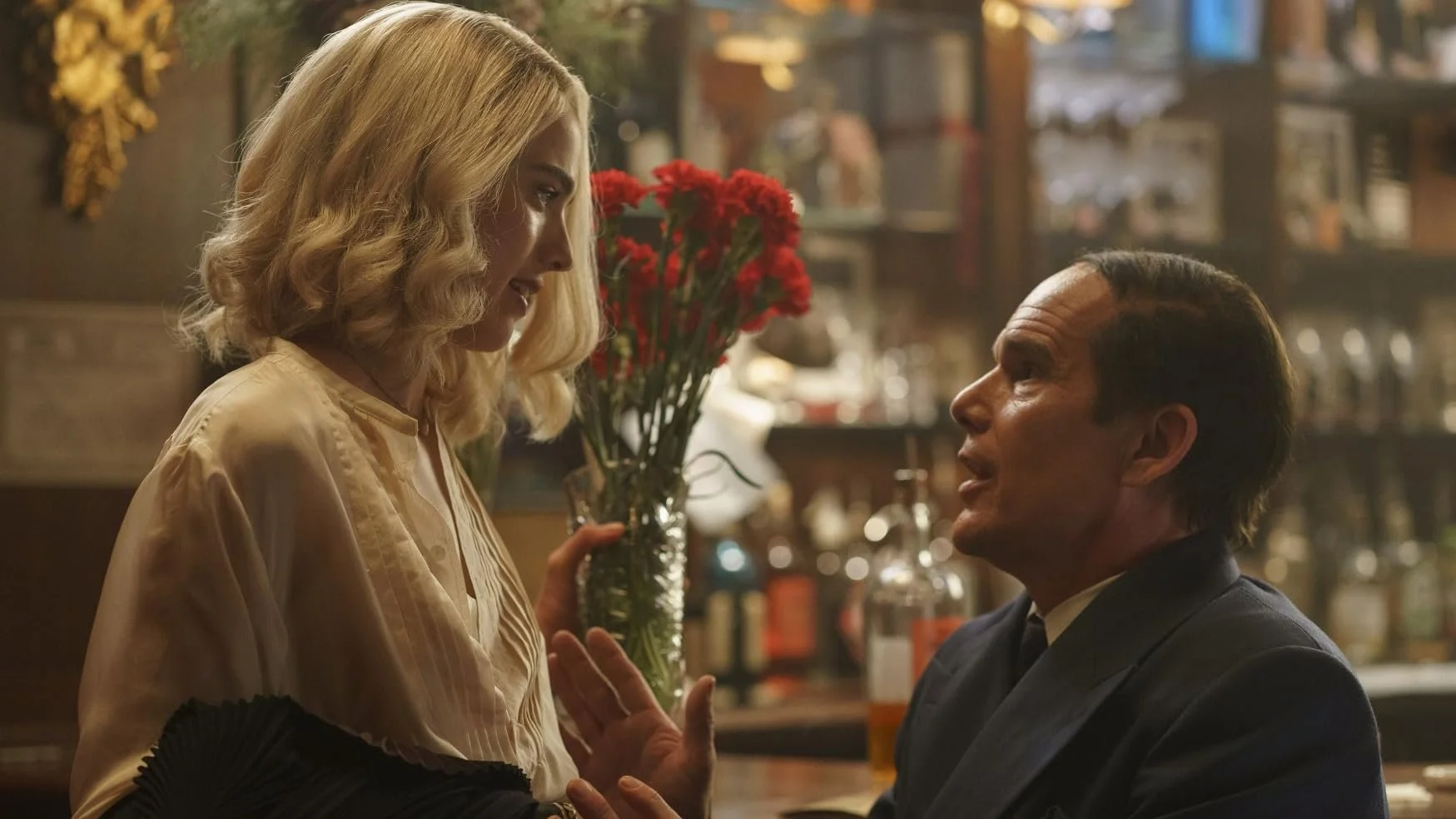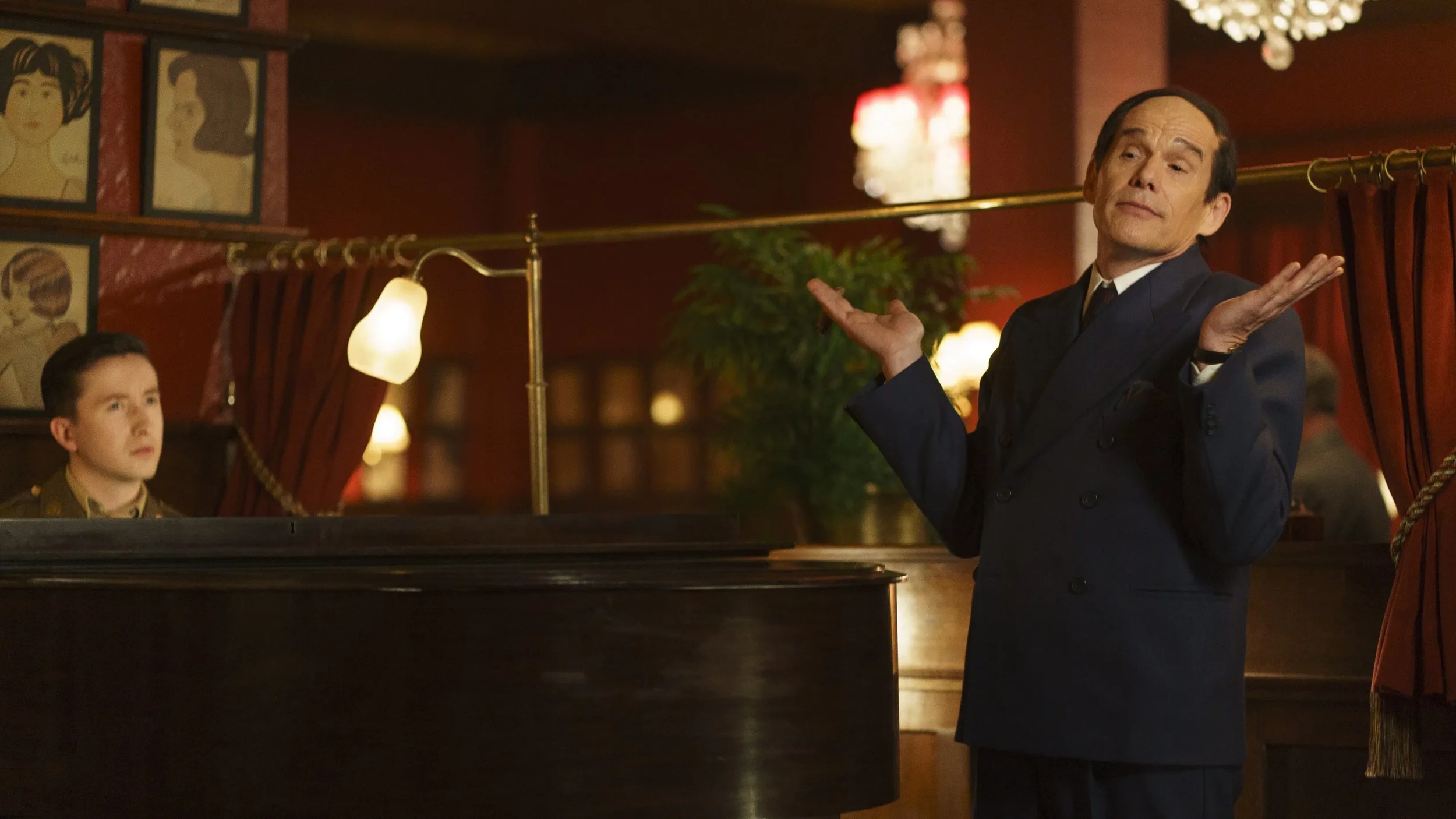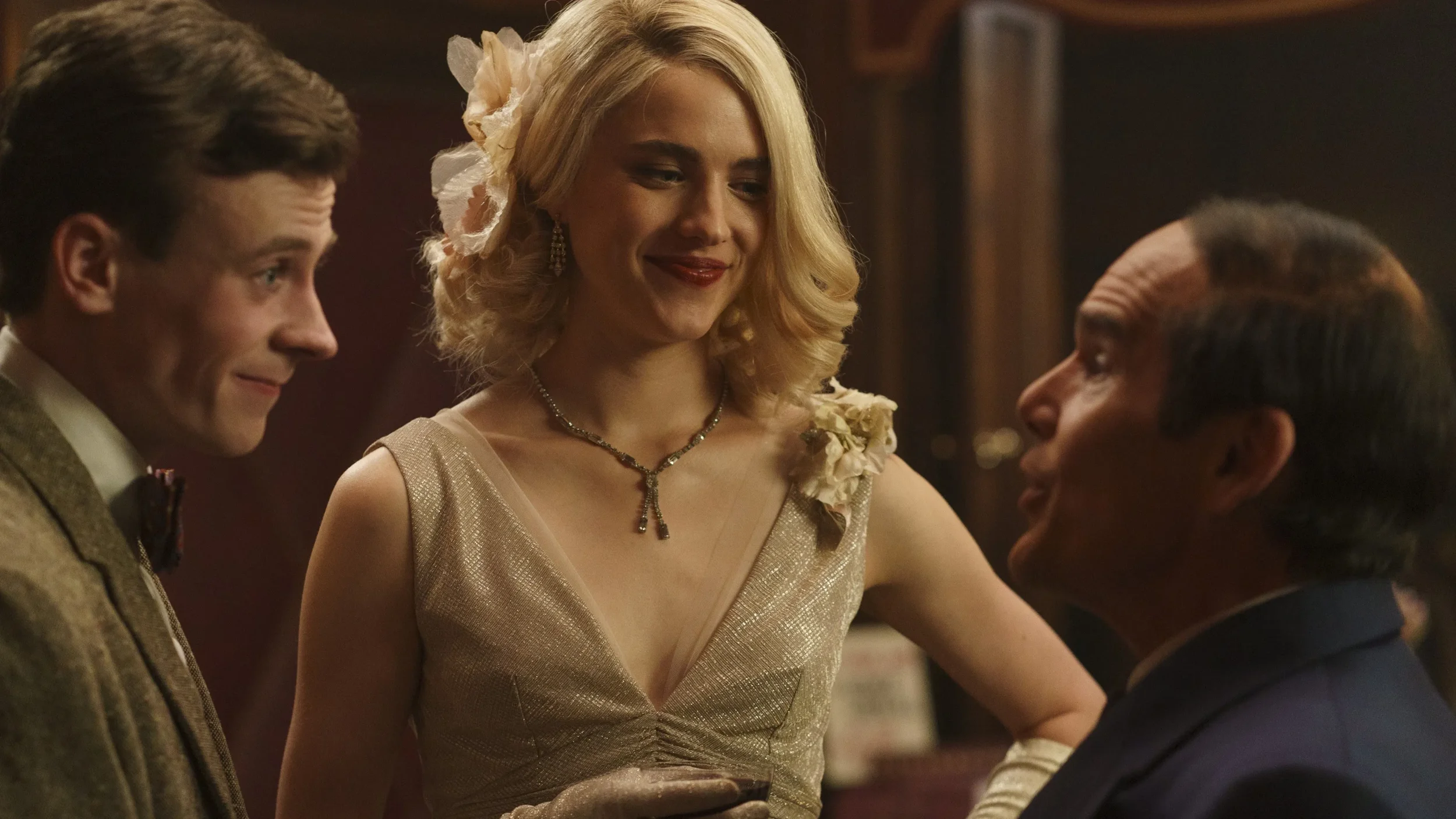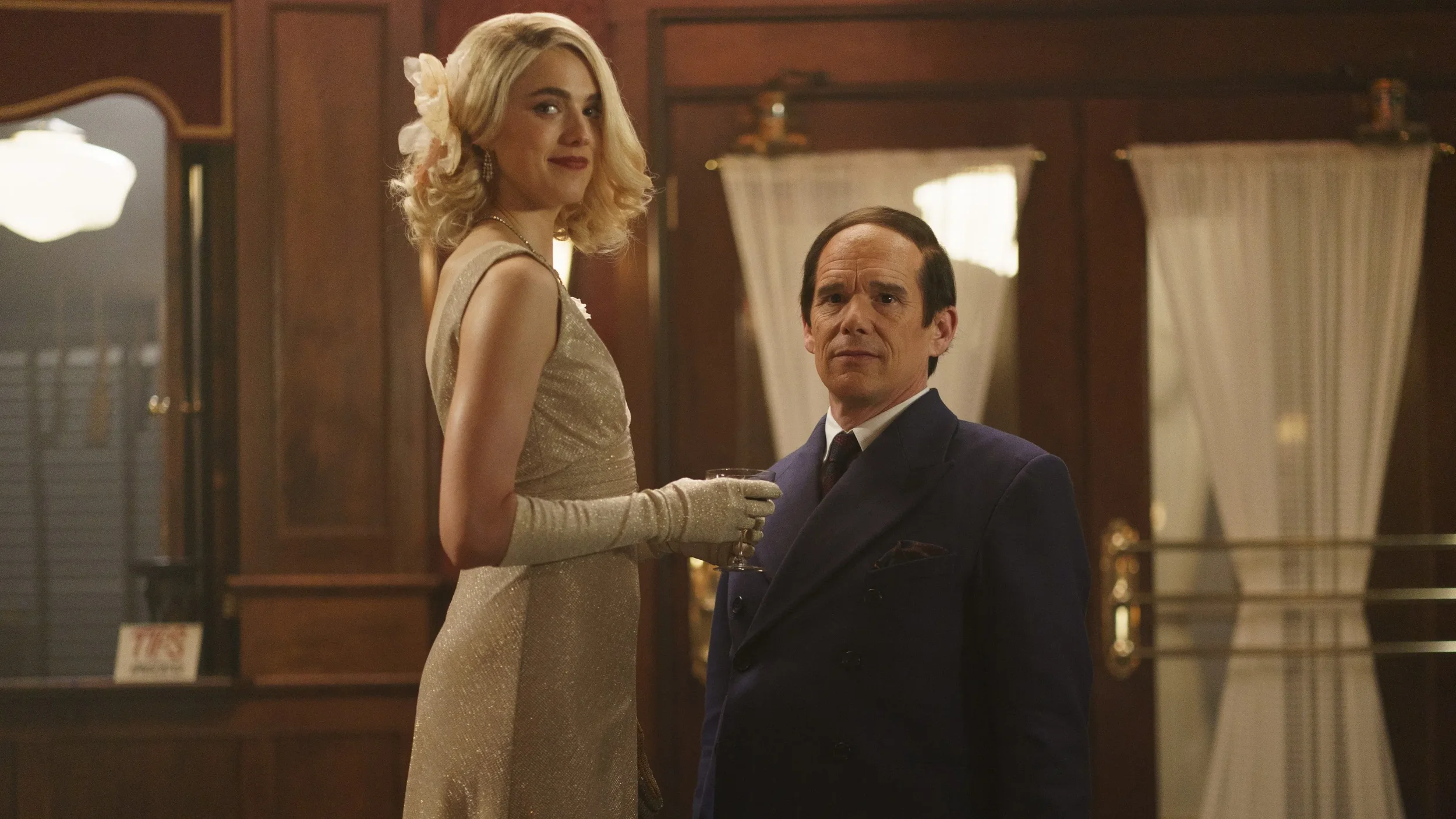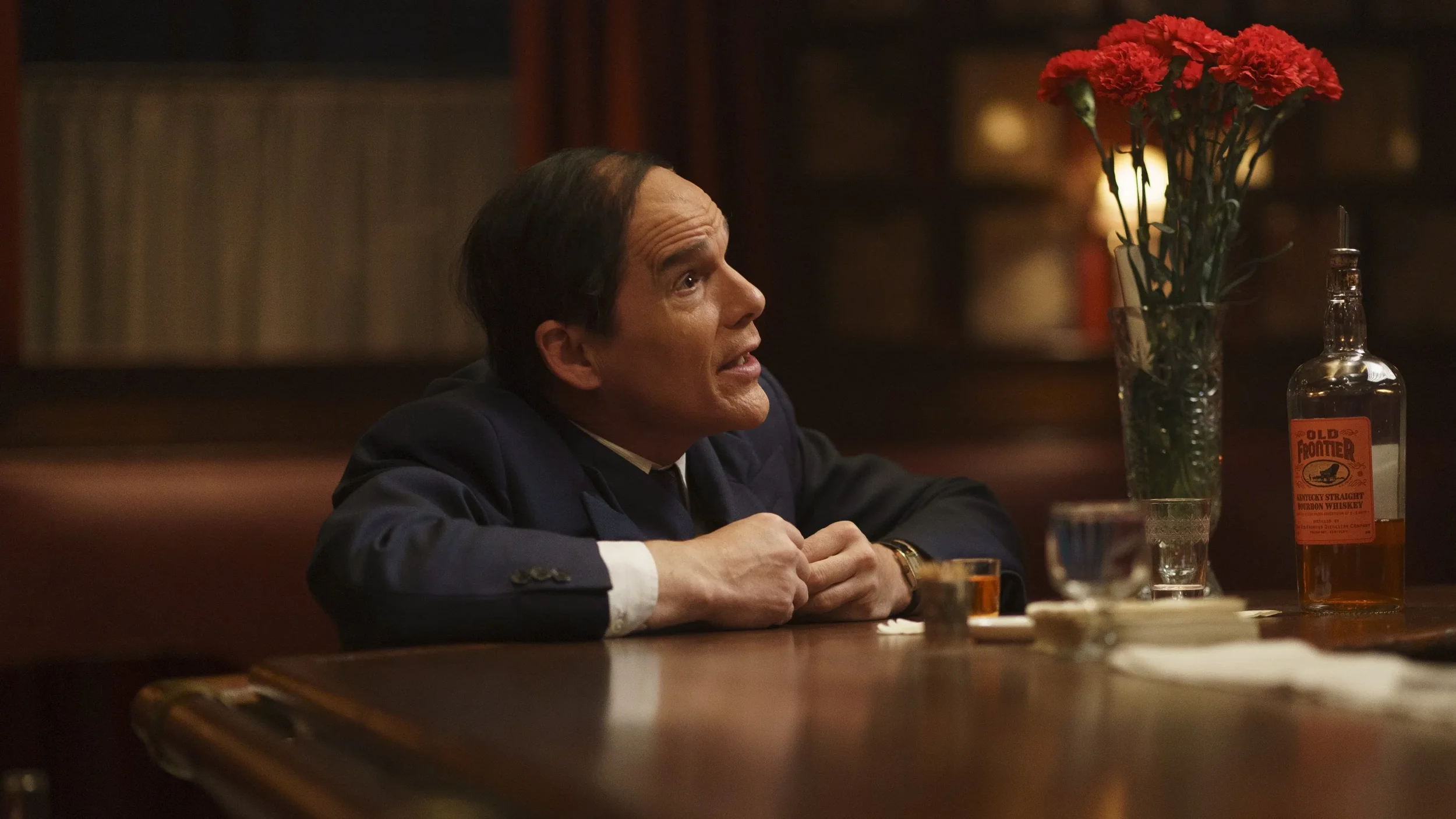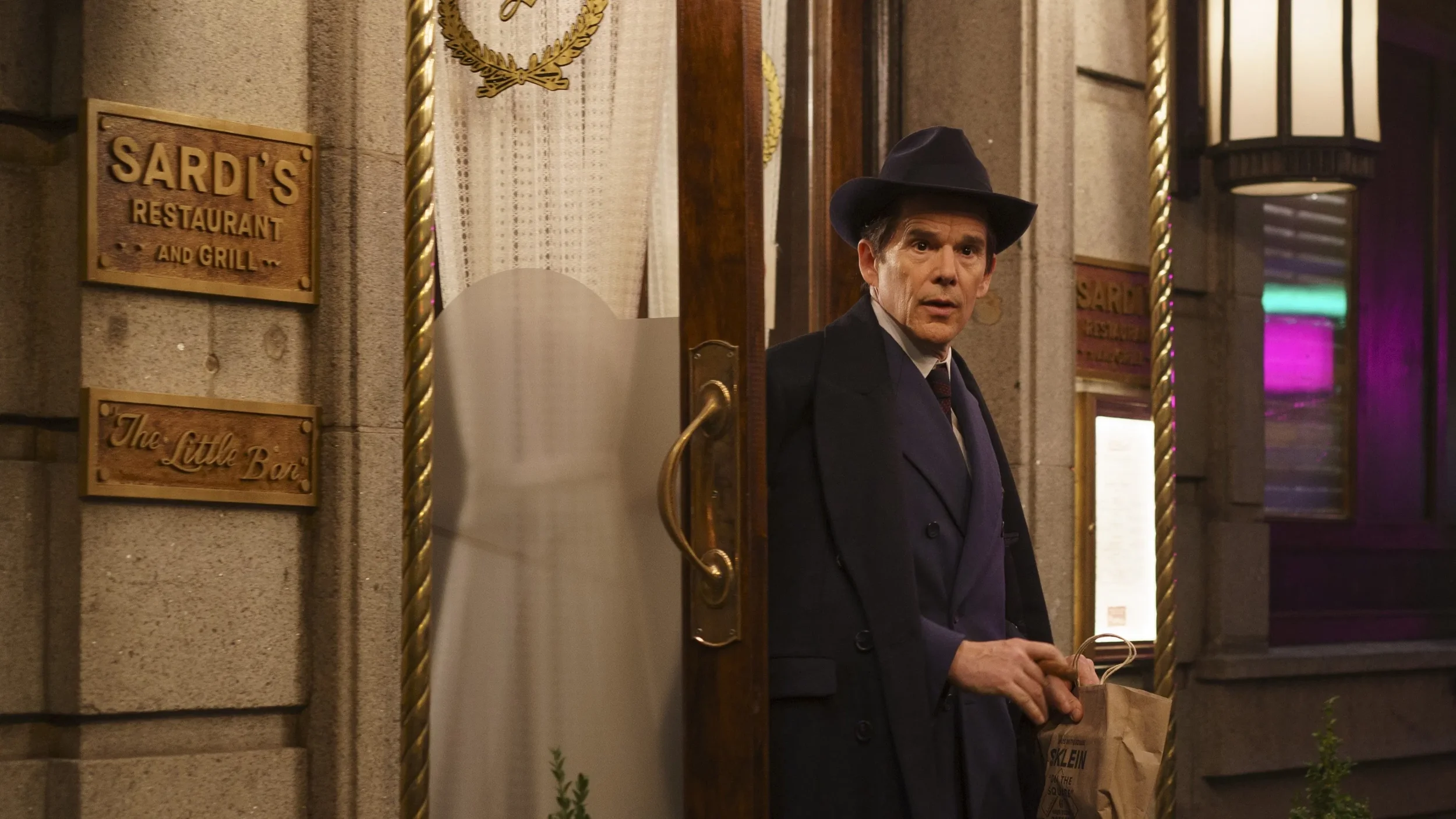In Conversation: Richard Linklater’s Blue Moon
The following conversation is transcribed from the Above The Line episode discussing Richard Linklater’s Blue Moon. The conversation has been slightly edited for readability.
Ian: For those who haven't seen it, first of all, go see it. It's a lovely movie… it's a pretty straightforward film. Ethan Hawke plays Lorenz Hart, who was the first writing partner of famed composer Richard Rodgers of Rodgers and Hammerstein. If you don't know, Rodgers and Hammerstein wrote Oklahoma!, which this movie centers kind of around the premiere of that musical. They also wrote the King and I, they also wrote The Sound of Music, a very successful songwriting duo. But before there was Rodgers and Hammerstein, there was Rodgers and Hart. And this movie is about Hart dealing with the fact that his former writing partner has moved on to another partnership and he's feeling a little lost and he's feeling a little left behind.
This movie takes place in one bar over the course of one evening. At a party celebrating that opening night of Oklahoma! and Lorenz Hart is dealing with the loss of his partner and also the fact that he's unsatisfied and unfulfilled in other areas of his life as well. McKenzie, I think it's no secret that we both really love this movie. I think we both went into it knowing we were going to love it and we were satisfied to find out that we both really loved it.
I think the first thing to talk about honestly is this Ethan Hawke performance is just fantastic. I do agree with what some people are saying, that the gimmick of making him appear shorter than he is in real life—I think maybe they're using some compositing or…?
McKenzie: I think so.
Ian: To basically superimpose him down a foot or something. I don't know exactly how it works. It's not forced perspective, I can tell you that it—looks a little janky sometimes.
McKenzie: Well, it's just in those wide shots because most of the film he is sitting or standing next to someone, and I have to assume they have those other actors just on boxes. I have to assume Margaret Qualley, in heels, who's already a tall statuesque woman is probably on a little apple box. Andrew Scott, he's an average sized dude, I'm sure he's on a couple boxes.
Ian: Ethan Hawke might be taller than Andrew Scott, to be honest.
McKenzie: Yeah! So I've assumed that in the scenes where they're walking or standing, they have platforms built where the other actors are walking on or standing on.
Ian: There are times when he shuffles over to the piano where I was like, “what's going on here?” But honestly, it didn't take me out of the film as much as some people have said, and even the people who are noting it are still focusing on the fact that his performance is quite astounding.
McKenzie: It's really, really good. I mean, I had a terrible audience for this one. Did not ruin my enjoyment of the movie… I love the movie and Hawke. He completely fades into this character in a way that is really, really astounding. I was reading a lot about how long this has been like percolating for Linklater and Hawke and how long they've been discussing wanting to do this. I don't know if you saw that interview where Ethan Hawke said 10 years ago he was like, “hey, when do we want to do Blue Moon?” And Linklater said something along the lines of, “women still want to fuck you. We can't do it until you're a little older,” and Ethan Hawke is like, “I don't know how to feel about that. Do women don't want to fuck me anymore?” and it was just really funny.
McKenzie: I think it makes sense to do it at this point in Hawke’s life because he is a little older. He's a little bit more settled into himself as a human being, as an actor, and I think he's able to tap into this middle-aged melancholy that Lorenz Hart is feeling. And I think that I've seen some people say that they find him to be an annoying character, which is like, yes. But I found a lot of empathy for this very sad man, right? The movie begins—this is not a spoiler—begins with his death. He died just seven months after the night that the film is tackling. I think as we watch this night, everything he says is tinged with this knowledge that we know he's going to die in less than a year from this night.
Ian: This is the last major evening of his life. The most consequential evening he'll have before he dies.
McKenzie: Yeah, and I think that that brings a level of melancholy that is intended. I think that I just fell totally in love with Hawke's performance. How completely he just transforms into this character. I've never seen him give a performance like that in my life. It is so transformative and it's not even a ton of makeup. Like, yes, he shaved his head and they added some makeup and they gave the comb over. But really it's the physical, the physicality of the way he as he's talking and the beautiful script. I loved this script. It was written so poetically and it feels reminiscent of the lyricism of Lorenz Hart. You probably heard Blue Moon, one of the most famous songs he ever wrote. Bewitched, Bothered and Bewildered, Isn't It Romantic, My Funny Valentine. You may not know his name, but you've probably heard his words and they were all very poetic.
The highlights for me were Hawke’s phenomenal performance, the beautiful, poetic script and then the really immersive, gorgeous, sound design and underscoring of these old school standards that just kind of play lightly underneath the whole movie. I was so swept up in it. It's like a play and I love that shit. I'm a theater kid. Ian and I are staunch defenders of Come Back To The Five and Dime, Jimmy Dean, Jimmy Dean, which is essentially a play filmed by Robert Altman. And I love it. I love movies that feel like plays.
Ian: I love the way that Hawke does kind of make himself diminutive because it's not just some of the wacky visual effects, which honestly, again, didn't take me out of the movie, but I really love the way that he kind of shrinks himself down. There's a bunch of times where he's talking to Bobby Cannavale's character who plays the bartender, in which he just feels small. It reminded me, there's this amazing moment in the Mr. Scorsese documentary where Isabella Rossellini is talking about Marty and she calls him a, “minuscule man.” And I was kind of thinking about that the whole time I was watching Ethan Hawke embody Lorenz Heart.
And he changes his voice. His mannerisms are slightly more effeminate. Ethan Hawke doesn't really play macho guys. He plays kind of cool guys think like, you know, Quentin Tarantino lead kind of. He's got that side of himself, but then he's got the very sensitive, soft side a la Linklater's Before Trilogy, which he embodies a lot. But there's something completely different to me about this performance. I really thought he keyed into a different wavelength for this role, which I really appreciated. I hadn't seen him do something this restrained in a long time and I'm a fairly big Ethan Hawke fan. I like him as a person. I think he's a lovely personality. I adore his documentary on Paul Newman and Joanne Woodward. That side of Ethan Hawke I absolutely love and there's so much in that guy who cares so much about the method and cares so much about the craft of acting being channelled through this historical figure who, while not an actor, is a member of that world. I absolutely love his performance.
I also really love this script. I know you just bought it. You just got like a $10 copy of it and we're kind of bummed that you don't have it yet because we wanted to reference it. But I went and saw it again just so I could take some notes and thankfully I was completely alone in that screening, so I whipped out the old cell phone and I just wrote down a bunch of lines. There's just so much beautiful language in this film, which makes total sense because this is a movie about writers. Not only is it about Richard Rodgers and Oscar Hammerstein and Lorenz Hart, obviously, but E.B. White—the author of Stuart Little—makes an appearance in what is probably my favorite 10 minute stretch of the movie. Robert Daniels wrote about this performance specifically, and I could not agree more with him that this performance is essential to the movie because this is the only guy that ever listens to him and sees him. My favorite line in the movie is said by E.B. White and it's in the trailer. McKenzie, I'm sure you know what I'm going to say is, “I think she recognizes that she's being adored by one of the great appreciators of beauty,” which I mean, that just sums up the man, right? I love this tiny little bisexual man who just loves, loves all genders and loves everybody. McKenzie, I could see you getting excited.
McKenzie: Ian, can I embarrass myself?
Ian: I mean, please. That's what the show exists for.
McKenzie: I did not know E.B. White wrote Stuart Little. So when they do [the] thing about Stuart Little, I just thought it was a coincidence. I was like, “that's weird!” I will say, again, does not ruin my enjoyment of the movie, but I can see someone maybe finding it a little hokey how many references there are like that.
Ian: Well, there's Stevie Sondheim.
McKenzie: Stevie Sondheim, which I did not clock until after the movie, that there's a little kid who was supposed to be Stephen Sondheim. I did not realize that him telling a story about this mouse was supposed to be inspiring the book Stuart Little—over my head completely. There's oh, the director, what's his face?
Ian: George Roy Hill.
McKenzie: Yeah, George Roy Hill kind of makes an appearance.
Ian: The director of Butch Cassidy and the Sundance Kid and The Sting gets told by Lorenz Hart to focus on “friendship stories.”
McKenzie: I think it's a little hokey, but I don't care.
Ian: I don't care at all.
McKenzie: I don't care, but Ian, I did not know he wrote Stuart Little. So I was sitting there like, “this is kind of weird but okay…” I feel like such a dumbass that I did not know that guy wrote Stuart Little. Look, I love Stuart Little. I love that little guy.
Ian: I'll embarrass myself and admit that I did not know it until my second viewing and I accidentally did confuse him with the author of Charlotte's Web.
McKenzie: He did write Charlotte's Web. He did both, yeah.
Ian: Then never mind, I'm not embarrassed. I fucking knew I nailed that shit.
McKenzie: You just nailed that shit, Ian.
Ian: I've also read The Elements of Style because I took a bunch of English classes in college and you kind of have to. So I know E.B. White and but I was just like, I thought it was like a really smart choice actually to bring in this famous author who would have been frequenting the same bars that Lorenz Hart would have been frequenting. And it's this amazing moment where they just get to talk about the way we speak and the way we write and they get to talk about language, which is something Linklater, Hawke, and obviously the script are obsessed with. It's the one moment in the movie that they get to talk about his craft, which is, you know, this movie is mostly about his lack of a love life, like his lack of meaningful relationships with anybody. And also this movie is also about how his most meaningful relationship is fraying, is coming to a close.
McKenzie: And the thing is, I also have a lot of sympathy for where Rodgers is coming from because it's hard to love someone who is so unable to take care of themselves. Andrew Scott is probably the most subdued I've ever seen him in a performance. And because I kind of associate him with being—I watched his Hamlet, I think of him as kind of like very funny, a little bit weepy, a bit big.
Ian: “That’s what people DO!” Moriarty.
McKenzie: Oh, I've never seen that.
Ian: He plays Moriarty in Sherlock with Benedict Cumberbatch and all he does is yell. Like there's this, there's this very like seminal part where he's confronted by Sherlock and Sherlock just is like talking about death and Moriarty just screams, “that's what people DO!” It's a meme at this point.
McKenzie: Oh my gosh. Well I knew him as Hot Priest first in Fleabag, which he's kind of snarky and funny in that. And then I watched him play Hamlet and he's very weepy and big and expressive in that. I was just surprised by how cold and subdued and especially next to Hawke, he really is playing the straight man in this, both literally and figuratively, I guess. I just found it to be a really fascinating performance from Andrew Scott. You just see so many wheels turning in his head as he is trying to navigate this, the discomfort he's feeling with Hart while also trying to experience what is at this point the biggest night of his career. While also feeling this weird guilt because there's this ghost hanging around him, reminding him of his past and the things he doesn't feel like he can go back to anymore. I just felt like Andrew Scott was doing a lot with a little. And even then he has a decent amount to do, but he's doing so much with his eyes and with his face and you see those wheels turning as he has these, I would say really tense conversations with Lorenz where you see that they both just want different things from each other. And I think that Andrew Scott plays the love and the anger very well together.
This idea of like he tells me like you were the most important man in my life. You were, you have always been so important to me. I cannot have the same relationship I've had with you for 20 years. Like he's trying to set a boundary really and it's just kind of sad. I just was really fascinated by Scott. I think it's just something to like again, like both him and Hawke are giving something I've just never seen from them before.
Ian: Yeah, I think it's an incredibly unshowy yet complicated performance because as you say, he's playing so many different emotions that are conflicting and existing alongside each other. I love that he's not just a villain. I love that he's just not mean to him. The most touching moment in the film to me is when Lorenz asks Rogers if he can send over some pages about this Marco Polo idea. And Andrew Scott just looks kind of astonished and says, “you have to ask that?” Then he tells him, “You are the reason I have a career. I owe you my professional life.”
Hawke is obviously amazing. But Andrew Scott, yeah, is maybe the stealth MVP of this movie, although everybody is kind of the stealth MVP of this movie. I love Cannavale as the bartender and the actor who plays E.B. White, Patrick Kennedy. But the last person who I think we should talk a little bit about—this is the second movie of hers this year that we've both really loved—is Margaret Qualley as this real life person in Lorenz Hart's life. But a lot of what we're seeing in the film did not actually happen, as far as we know. All we know for a fact is that Hart and this character, Elizabeth Weiland, wrote letters to each other. I was reading a little bit about this. We don't even know if they ever met in person, but we know that they wrote these letters together and that he admired her greatly and she let him. This is what makes this movie so sad to me, is this relationship.
McKenzie: Yeah, I've been seeing some people say that she is the weakest link of this movie. And I can definitely see that she's the youngest, she's the least experienced of all these actors. But she, I think that almost to me, enhances the role she is playing here because she is playing such a young sort of, not naive—
Ian: I think she's playing somebody giving a performance… I think that this is a person who is young, who is a little naive, a little bit out of her depth and really trying to make in ways and is projecting something out into the world that maybe is not true to her. I think she's excellent though.
McKenzie: The moment you've kind of got to get on her wavelength is the closet. That's her highlight scene and it's the highlight of that relationship. And I feel like that was the moment I really locked into I think what she was doing and also like why she was there in the first place. I saw some reviews that kind of irritated me that were saying like, “oh, this old man is sexualizing this 20 year old girl,” and I think that's just a total misunderstanding of what that relationship is because to me, yes, he is admiring her and he kind of says he's in love with her, but to me it feels more like he wants to live vicariously through her. I think he wants to be loved. I think that no matter the gender of the person, he wants to be loved in some capacity. And the idea of being loved by someone as beautiful and as talented and as youthful as her is an exciting thing to him.
But I think that when he's listening to her talk about this like sexcapade essentially that she had he's titillated, I think, not just by her, but by Cooper, by this unseen man. I think he sort of wants a life partner he can sort of be with and live through and I think that's what he wants from her. And when she, you know, similarly turns him down to his as such as his previous lady in his life, Vivienne, you know, I think it breaks his heart. And I think that scene is so sad and interesting. I don't know, I just think this relationship is more than an old man being a lech. Like, I think there's a lot more going on here.
Ian: He's also a messy gay bitch who lives for the drama. He is so excited. I'm like this. I love to hear about my friends and what kind of fucked up shit they're getting into and like what not. I think it's great. I think that that is just such a bad faith interpretation of what is going on here and we see a lot of that these days with Zoomers—and I'm a Zellenial. I'm a part of that crowd, I bridge the generation gap. But there's a lot of younger people who see anything that's not exactly perfect or “right” or “correct” and take some kind of moral issue with it when that's not the point. This movie is about a man who was so sad and never had his life together and also lived in a world where he could not be openly gay. And I don't actually know if Lorenz Hart was a bisexual. The movie is like half heartedly kind of painting him as one, but the man clearly is queer. At least.
McKenzie: I think it was one of those complicated things where he was probably gay.
Ian: Yes, I think so, too.
Mckenzie: Did you see that story where someone asked Richard Rodgers at a party if [Hart] was gay and Richard Rodgers [grabbed] the guy and was like, “if you print that, I'll kill you,” or something. I think people were defensive over him. I would assume, I don't know what Lorenz Hart’s estate is like, but I assume that it's probably hard for people to explicitly say anything about his sexuality for fear of retribution. I get the feeling that he was in the closet and gay, but like in the closet publicly, but probably in his private life and in his inner circles acting however he wanted to, as we see in this movie.
Ian: What I love so much is how he is telling these very lewd, crass jokes with the bartender who he's clearly close with and how the coat check girl knows him intimately and how he's just kind of, he's an alcoholic clearly, and he's just a regular here. But I just love the interactions and the dynamics between him and the staff at the bar and the young man playing the piano who he nicknames Knuckles. I love that he gives every young man he meets who he's obviously sexually attracted to fun little nicknames. Sven, Knuckles. It's fantastic.
McKenzie: “Sven, you've got to come to my party! It’s going to be an amazing party with the Golden Quartet!”
Ian: I was like, “he wants to fuck you so bad!”
McKenzie: That’s the thing, yeah, but I think I also can see the appeal of having a female life partner who is not only like public, like a lavender marriage, like someone you live alongside and through and with and yeah.
Ian: Yeah, and asking that one woman. He keeps on referencing that. He keeps on asking her to marry him. It sounds like this older patron of the arts is what I'm getting. I don't know who exactly he's talking about.
McKenzie: She was an actress.
Ian: See, a lot of the theatrical stuff, the Broadway stuff, it goes right over my head.
McKenzie: She was Vivienne Segal. She was like an actress in the early 1900s. It looks like she was best remembered for starring in Pal Joey, which was one of Rodgers and Hart's musicals that the song Bewitched, Bothered and Bewildered, which if you've heard it, you've probably heard Ella Fitzgerald singing it. It was introduced in Pal Joey. So yeah, she was like an actress who I think starred in a bunch of their shows when she was younger.
Ian: This isn't like a big thing McKenzie, but the last thing I wanted to know is just how the language is obviously great, the script is obviously excellent. This movie is so funny. I was shocked by how crass and crude and I guess gaudy the humor was Lots of potty humor, lots of sexual innuendo, and also sometimes just not. I love the moment where he talks about how attractive a half erect penis is, that it's a promise. Where an erect penis is an exclamation point. “Oklahoma—exclamation point!”
McKenzie: As a hater of the musical Oklahoma! — this was a treat because I hate that musical so much. I'm actually really not a Rogers and Hammerstein fan. I just prefer the Sondheim era, if you will, that kind of 60s /70s era of musical theater. And I hate Oklahoma! in particular. I've been in Oklahoma! so I feel like I'm allowed to say that, I was one of the Can-Can girls in the dream ballet. Okay, I'm allowed to say this musical sucks. And so I loved hearing him talk shit about music about Oklahoma! the whole night.
You can listen to the full conversation on our Above The Line podcast.
